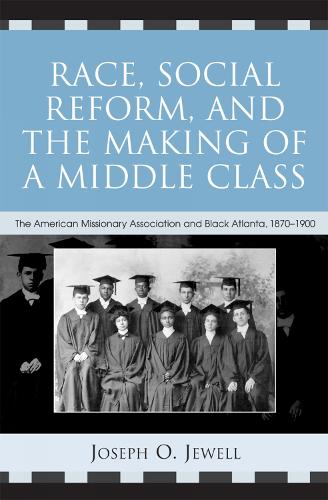
Race, Social Reform, and the Making of a Middle Class: The American Missionary Association and Black Atlanta, 1870-1900
(Paperback)
Publishing Details
Race, Social Reform, and the Making of a Middle Class: The American Missionary Association and Black Atlanta, 1870-1900
By (Author) Joseph O. Jewell
Bloomsbury Publishing PLC
Rowman & Littlefield Publishers
21st March 2007
United States
Classifications
Tertiary Education
Non Fiction
Ethnic studies / Ethnicity
Social and cultural history
305.5
Physical Properties
Paperback
236
Width 155mm, Height 230mm, Spine 18mm
354g
Description
Moral reform movements targeting racial minorities have long been central in negotiating the relationship between race and class in the United States, particularly in periods of large scale social change. Over a century ago, when the abolition of racial slavery, Southern Reconstruction, industrialization, and urban migration presented challenges to both race and class hierarchies in the South, postbellum missionary reform organizations like the American Missionary Association crusaded to establish schools, colleges, and churches for Blacks in Southern cities like Atlanta that would aggressively erode cultural differences among former slaves and assimilate them into a civic order defined by Anglo-Protestant culture. While the AMA's missionary institutions in Atlanta sought to shift racial dynamics between Blacks and Whites, they also fueled struggles over the social and cultural boundaries of middle class belonging in a region beset by social change. Drawing upon late nineteenth century accounts of AMA missionary activity in Atlanta, Black attempts to define and maintain a middle class identity, and Atlanta Whites' concerns about Black attempts at upward mobility, the author argue that the rhetoric about the implications of increased minority access to middle class resources like education and cultural knowledge speaks to links between anxieties about class position and racial status in societies stratified by both class and race.
Reviews
This book definitely expands our understanding of the urban post-emanicpation experience of southern African Americans. -- 2008 * The Journal of African American History *
Clear and logical... its legacy will be precisely in what it does to draw attention to and encourage further research on the specific historical processes of racial class formation in the African-American community. * American Journal of Sociology *
Joseph Jewell's book is a cutting-edge effort in sociologically informed historical analysis, one that probes deeply into the making of the Black middle class, primarily in the city of Atlanta in the years 1875-1915. Demonstrating significant research imagination, Jewell shows clearly, and with original data collection and reanalysis of previous studies, how the social reform efforts of northern missionary organizations both facilitated and frustrated the growth of a new Black middle class. -- Joe R. Feagin, Texas A&M University
Author Bio
Joseph O. Jewell is an associate professor of sociology at Texas A&M University, where he specializes in sociology of education, historical sociology and race/ethnic relations. His work explores historical intersections between race, class, and gender in the United States.
